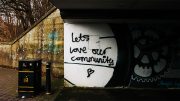 By: Paul P. Jesep*/TRT Columnist–
By: Paul P. Jesep*/TRT Columnist–
The question most often asked after a tragedy or during suffering is “why.” Hate crimes, terminal illness from AIDS, ongoing legal discrimination and emotional abuse toward the LGBTQ community, or the recent mindless, terrorist attack in Boston, will prompt people to ask of themselves and others this difficult question.
Some will turn to religious and spiritual leaders wanting to know why the Creator permits such things. The simple answer, if one exists, is that the Maker of the Universe does not.
Why is a search for our own meaning predetermined by mortality? Throughout history, great thinkers have asked why without success. It is like walking on a treadmill going nowhere, and worse, without burning calories.
Why is there a universe? Why are there terrorists? Why are there dogs and cats? Why are there fleas, ticks, lawyers and mosquitos? Why am I different? Asking why uses up an enormous amount of energy. Let go. Otherwise, if you are not on the treadmill going nowhere, you will find cold, hard, deceptively logical facts without feeding an inherently spiritual hunger.
Instead of asking why, focus on the experience of living. Attempting to understand why bad things happen to good people becomes an endless conversation within your head. Every kind of experience, though some are threatening and very painful, has the potential to lead to self-discovery.
Do not spend time asking why mountains have grandeur, chirping birds sound sweet, or autumn colors are magical. Experience them by being alive. It does not matter whom or what created them. They exist. They are reality. Love, hate, tragedy and happiness are reality. They just are. Life just is.
This does not diminish or fill the void that loss and heartache bring. Yet they too are experiences, often cathartic and necessary for healing, closure and possibly leading to deeper self-awareness. In the broadest sense, they can provide spiritual perspective and with it new direction. [pullquote]The Boston tragedy is now a sad chapter in American history. The responses so far showed a national, not Boston or New England, experience. Although no one can ever question the indomitable spirit of any Bostonian, there were no Bostonians on April 15.[/pullquote]
Experiences either empower or become destructive. The reactions to death, illness, job loss, romantic breakup, or a national tragedy define us individually and collectively. A nation or individual can believe in pain or experience it. Regularly eating a pound of chocolate for months after a breakup is belief in pain, not experiencing loss in a positive way.
It is easier to believe in something, often by asking “why me,” than choosing the experience. Part of this may stem from unhealthy parental, religious, or societal conditioning.
The Boston tragedy is now a sad chapter in American history. The responses so far showed a national, not Boston or New England, experience. Although no one can ever question the indomitable spirit of any Bostonian, there were no Bostonians on April 15.
Moments after the tragedy there were no Boston Irish, Southend Italians, LGBTQ Bostonians, or Beacon Hill Brahmins. Although there is a human and understandable need to ask why collectively as a nation, this tragedy is experienced in a common humanity.
Joseph Campbell once said the “experience of being alive, so that our life experiences on the purely physical plane will have resonances within our own innermost being and reality” to “actually feel the rapture of being alive” is “what it’s all finally about.” The Boston tragedy, or any misfortune experienced on a personal, national, or community-wide level, cannot be about the “search for meaning,” because it is too limiting and not likely to carry you very far. It must be about “the experience of meaning.”
*Paul is an author, attorney, and a seminary trained, ordained priest in greater Albany, NY. He recently authored “Lost Sense of Self & the Ethics Crisis – Learn to Live and Work Ethically,” and is founder of www.CorporateChaplaincy.biz.”






